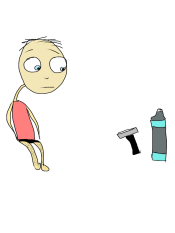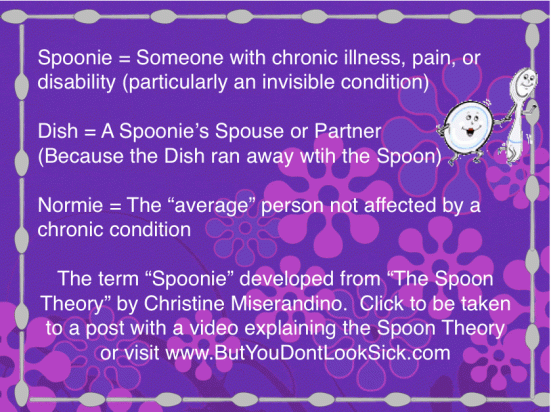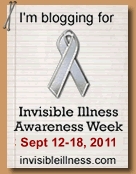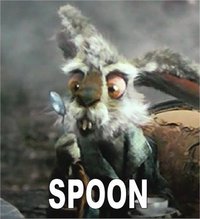 It’s Invisible Illness week. This week is dedicated to spreading awareness about chronic illness, 96% of which is
It’s Invisible Illness week. This week is dedicated to spreading awareness about chronic illness, 96% of which is  “invisible.” Explaining chronic disease to “normies,” isn’t always the easiest process.
“invisible.” Explaining chronic disease to “normies,” isn’t always the easiest process.
Many of us come from a background where our symptoms were dismissed for years, misdiagnosed, or were told that they were “in your head.” So, not being taken seriously is something we’re sensitive to. Even after a proper diagnosis we still hear comments like, “everybody’s tired,” “you must not want to be well,” “you’re only tired or hurting when it’s something that you don’t want to do/when it’s for me,” “you’re lazy,” “you use your illness as an excuse,” and “it can’t really be that bad.”
 I recently stumbled upon a video by Christine Miserandino in which she reads her “Spoon Theory,” something she came up with to explain to a friend what it is like to live with a chronic disease. I think Christine does a good job at demystifying the general day-to-day life of a chronically sick person. As I watched the video, I related to so much to what she had to say. I wanted to cheer that someone else knew that washing your hair and shaving your legs can be detrimental to your day. I have posted the video below, or you can read the story on her site: But You Don’t Look Sick.
I recently stumbled upon a video by Christine Miserandino in which she reads her “Spoon Theory,” something she came up with to explain to a friend what it is like to live with a chronic disease. I think Christine does a good job at demystifying the general day-to-day life of a chronically sick person. As I watched the video, I related to so much to what she had to say. I wanted to cheer that someone else knew that washing your hair and shaving your legs can be detrimental to your day. I have posted the video below, or you can read the story on her site: But You Don’t Look Sick.
The “Spoon Theory” explains why I worry about a commitment that is days away, even if it is the only thing that I have on my agenda for that day. My constant awareness of my “spoons” and of the tried-and-true fact that they can be taken from me at any time is why deciding between activities, even fun ones, is a big deal to me. I know choosing to use a spoon for one thing means that I will not  have a spoon for something else. And once I give up my spoon, I cannot change that decision. My desperate desire to conserve my spoons is why I try to plan my day and actions to minimize energy expense. I will wait to get a drink until I have to go to the bathroom. I might ask someone to get something for me when it seems like it would be just as easy for me to get it myself. I’ll decline doing something today because I want to go to dinner with my family tonight.
have a spoon for something else. And once I give up my spoon, I cannot change that decision. My desperate desire to conserve my spoons is why I try to plan my day and actions to minimize energy expense. I will wait to get a drink until I have to go to the bathroom. I might ask someone to get something for me when it seems like it would be just as easy for me to get it myself. I’ll decline doing something today because I want to go to dinner with my family tonight.
The Spoon Theory video. Two spoons up!

This was an image I made to use in other posts to help Bottled Time Travelers understand Spoonie Terminology. In other posts it is linked to here. If you click it now, you will be taken to the main Spoon Theory site.
 The ideas in the “Spoon Theory” inspired me to write the poem “Spoon Thief.” Slightly silly, but isn’t that important in life?
The ideas in the “Spoon Theory” inspired me to write the poem “Spoon Thief.” Slightly silly, but isn’t that important in life?
For Invisible Illness Week, I also bottled some Spirit reflections in the post: “Deep Breath. Start Fresh. Devotional.” Pictures and music are included to enhance the experience.

Related articles from other sites:
- Question of the Week: Are You Ready to Start Fresh? (ohmyachesandpains.info)
- A personal experience demonstrating the effects of chronic illness on time management: At last (mynewstrangelypeculiarblog.wordpress.com)

The Spoon Theory made perfect sense to me because I see mom budgeting her spoons, especially when she plans something more strenuous like going out or seeing her grandchildren. It is something she still struggles with at times because she wants to be able to do so much more. I think spoons are a good way to explain a more invisible part of illness.
Chronic illness is definitely a loss. Like a pianist who looses a hand or an athlete who looses a leg, there is a part of us that is gone, that has changed our lives forever, and we can never get it back. We miss that part. We long for it. And we will always be aware that it is missing even as we grieve and move forward. Unlike the musician or athlete though, much chronic illness is invisible to the outside observer. This certainly does add it’s own layer of complication. People are less likely to grieve with you, or offer you comfort or support when they can’t see what you have lost. The decisions that I must make are hard and I don’t have any kids or grandkids. I do have nieces and nephews (including a beautiful goddaughter). This can only give me an inkling of what your mom must feel. Hugs and prayers for you both and may God bless her spoons.
Pingback: Spoon Thief | Bottled Time
Pingback: Deep Breath. Start Fresh. Devotional. | Bottled Time
Pingback: Virtual Reality or Virtual Escape? | Bottled Time
Pingback: My Monster Transformation: The Top 10 Ways My Medical Conditions and Treatments are Warping Me Into a Halloween Mutant from the Dark Side « Bottled Time
Pingback: Brrrr! | mynewstrangelypeculiarblog
Pingback: My Hair-owing Halloween with an Ambulatory EEG « Bottled Time
Pingback: Chronically Rediscovered Chapter One: Colitis for Christmas and Sky Lanterns for the Soul | Bottled Time – Living, Loving, Laughing, Learning, and Growing through Chronic Illness and Pain
Pingback: Chronically Rediscovered Chapter Two: I’m Late! I’m Late! For a Very Important Fort War! | Bottled Time – Living, Loving, Laughing, Learning, and Growing through Chronic Illness and Pain
Pingback: Chronically Rediscovered Chapter Three: Crashing Into Inspiration and Lasik Eye Surgery | Bottled Time – Living, Loving, Laughing, Learning, and Growing through Chronic Illness and Pain
Pingback: Curiously Seeking Beauty to Escape the Dark Chocolate Downs of Chronic Illness | Bottled Time – Living, Loving, Laughing, Learning, and Growing through Chronic Illness and Pain
Pingback: I Do Tricks for Treats!: My First Experience with Cimzia for Inflammatory Disease | Bottled Time – Living, Loving, Laughing, Learning, and Growing through Chronic Illness and Pain
Pingback: My Monster Transformation: The Top 10 Ways My Medical Conditions and Treatments are Warping Me Into a Halloween Mutant from the Dark Side | Bottled Time – Living, Loving, Laughing, Learning, and Growing through Chronic Illness and Pain
Pingback: Four Fantastic Days & Five Purple Prizes | Bottled Time – Living, Loving, Laughing, Learning, and Growing through Chronic Illness and Pain
Pingback: Tipping Our Top Hats to Purple Day 2012 | Bottled Time – Living, Loving, Laughing, Learning, and Growing through Chronic Illness and Pain
Pingback: 8000 Feet of Free Fall: Update on My Crazy Chronic Life « Bottled Time – Living, Loving, Laughing, Learning, and Growing through Chronic Illness and Pain
So I know it has been awhile since you made this post but I wanted to tell you that I insisted a friend read this page and we now discuss his depression in terms of spoons 🙂
Christine is a genius. The Spoon Theory helps those of us with chronic illness think about our daily lives in more concrete terms and the Dishes and Normies in our lives to understand them better. Glad this post was able to help!